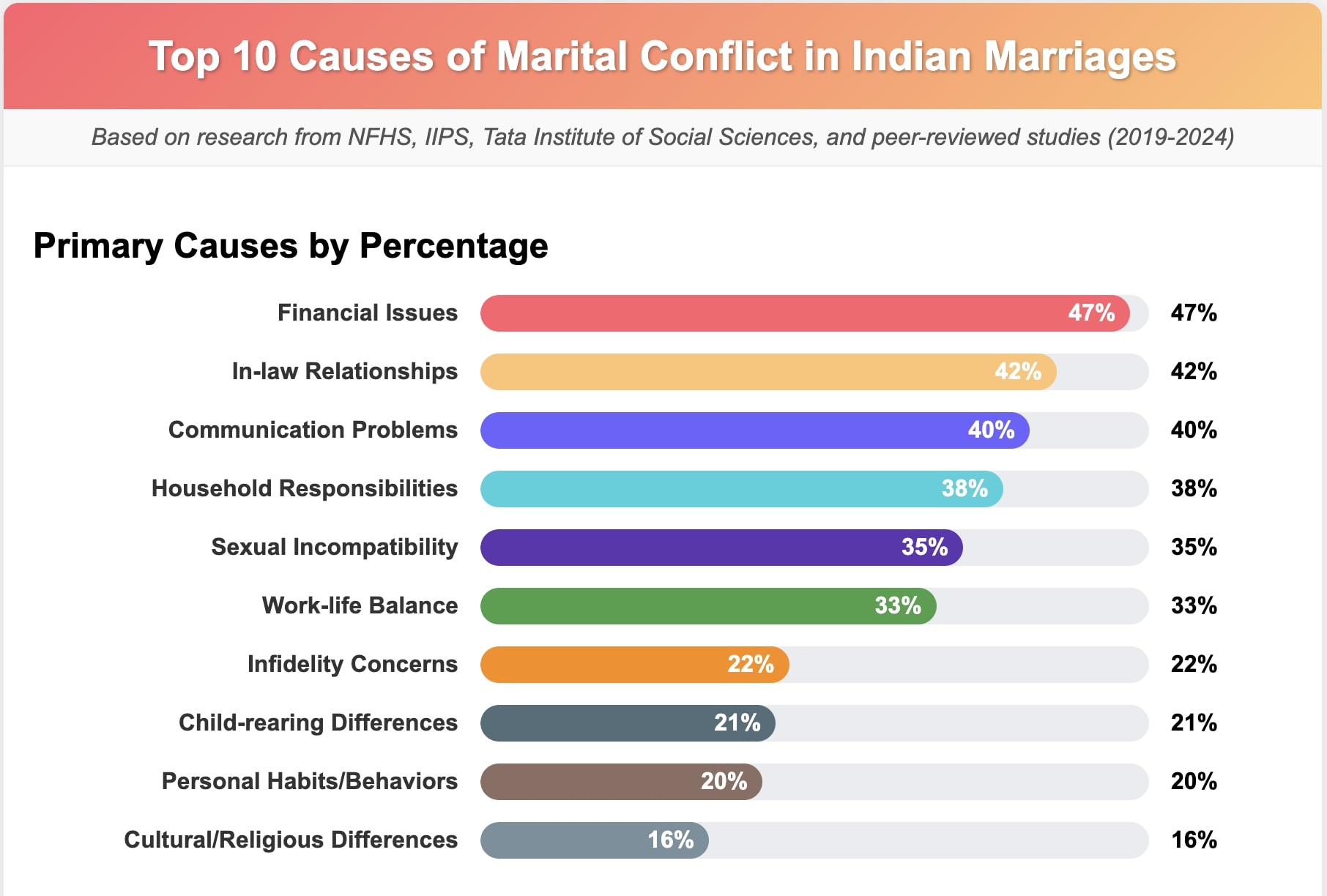
Amaha / / /
ARTICLE | 6 MINS READ
5 Ways in which Relationship Counsellors help you reconnect with your partner - Understanding Relationship Counselling in India
Published on
20th May 2025

Dr Anuradha Kabra
MD Psychiatry

Navigating Relationship Troubles - What is relationship counselling
Relationships are difficult and messy. One minute you're floating on cloud nine, and the next you're wondering if you even know the person sleeping next to you anymore. Wondering if you are not again overthinking your relationship?
That's where relationship counselling comes in. But what exactly does a relationship counsellor do? And how does relationship counselling work in the Indian context?
The Role of a Relationship Counsellor in India
A relationship counsellor is your guide through the rough road of love and partnership. Think of them as a relationship doctor – they don't just prescribe fixes but help you understand what's actually going on beneath the surface.
Relationship counsellors in India however often have to function differently, given that marriage is seen as a sacred bond between families and not just individuals, and not as something easy to walk out of, as it is in many parts of the world. They balance traditional values with modern relationship dynamics. This is in the modern day known as couple's therapy.
Here’s what a relationship counsellor does:
- Create a safe space for both partners to express themselves
- Help identify unhealthy patterns in your relationship
- Identify blind spots in the way you communicate with your partner
- Teach communication skills that actually work
- Guide you through conflict resolution
- Help rebuild trust when it's been damaged
You will definitely get this question in your head "Can't we just talk through our problems ourselves?" Well, sometimes you can! But relationship issues have a way of becoming fights where nobody's listening and everyone's just waiting for their turn to speak.
What is Marriage Counselling and How is it Different?
Marriage counselling is essentially relationship counselling specifically for married couples. The terms are often used interchangeably, but there are some subtle differences.
Marriage counselling might address additional layers like:
- Joint family dynamics and in-law relationships
- Cultural and religious expectations
- Balancing traditional roles with modern aspirations
- Community perceptions and social pressures
- Personal and financial matters of the family
My parents didn’t go to counseling, so why do we? That is a fair question! But society has changed greatly. Today’s marriages are under different pressures from career balance to social media to changing gender roles. What worked for our parents may not be enough for the issues today’s couples face.
How Does Relationship Counselling Work?
Let me explain the process. Relationship counselling isn't about a random stranger telling you what's wrong with your marriage. It's much more collaborative than that.
The Process of Relationship Counselling
First sessions usually involve:
- Getting to know both partners individually and as a couple
- Understanding your relationship history
- Identifying your goals for counselling
- Establishing ground rules for sessions
Subsequent sessions might focus on specific issues, communication patterns, or rebuilding emotional connection. Most counsellors use a combination of listening, observation, exercises, and homework assignments to help you progress.
Sometimes sessions might feel uncomfortable and even awkward. The counsellor creates a structured environment where difficult conversations can happen productively rather than destructively.
Common Causes of Relationship or Marriage Problems
Understanding what's causing your relationship difficulties is half the battle. Here are some common issues modern Indian couples face:
- Communication breakdown – You're talking but not really hearing each other. Or maybe you've stopped talking altogether about anything meaningful.
- Trust issues – Perhaps there's been an incident of infidelity, or maybe smaller breaches of trust have accumulated over time.
- In-law relationships - 43% of couples report in-law interference in decision-making
- Financial disagreements – In today's world, money stress can seriously impact relationships. Different spending habits or financial priorities can create ongoing tension.
- Household responsibilities - Women spend 5-6x more time on housework than men on average. 72% of working women report a "second shift" burden. Only 26% of men regularly contribute to child-rearing tasks
- Intimacy problems – This isn't just about physical intimacy (though that's important too). Emotional intimacy often suffers first when couples grow apart.
- Extended family dynamics – A challenge particularly relevant in India, where joint families or close family ties can introduce complex relationship dynamics.
- Work-life imbalance – With demanding careers and long commutes in Indian cities, many couples struggle to prioritize their relationship amid competing demands.
- Cultural and value differences – Even couples from similar backgrounds may discover they have different values or expectations about marriage.
Sometimes just identifying these issues alone can bring enormous relief.


Feeling Disconnected in your Relationship?
Take the Amaha assessment to know if it is a temporary relationship bump or there are deeper concerns.
Signs and Symptoms Your Relationship Needs Professional Help
- Constant criticism and defensiveness – If conversations regularly devolve into attacking and defending, you're stuck in an unhealthy pattern.
- Emotional withdrawal – One or both partners have "checked out" emotionally.
- The same fights, over and over – You're trapped in conflict loops with no resolution.
- Keeping score – When you're tallying up each other's mistakes instead of working as a team.
- Contempt has entered the relationship – Eye-rolling, mockery, or disgust signals serious trouble.
- Major life transitions are creating strain – Whether it's having children, career changes, or health challenges.
- Secrets are building walls – When transparency has been replaced with hiding things.
You can also take Amaha's 5 minute Relationship assessment to check the health of your relationship
Steps to Connect Better With Your Partner Through Counselling
Building a Stronger Relationship Foundation
A good counsellor will help both the partners with the below skills:
- Learn to truly listen – Most of us think we're good listeners, but relationship counselling teaches active listening techniques that transform how you hear each other
- Express needs clearly – Many conflicts stem from unexpressed or poorly communicated needs
- Rebuild respect and admiration – Over time, focusing on negatives can erode your appreciation for each other. Counselling helps reverse this
- Navigate differences constructively – Differences don't have to be dealbreakers when you have tools to address them healthily
- Create new rituals of connection – Small, consistent moments of connection are often more powerful than grand gestures
Key Relationship Skills a Counsellor Helps You Develop
Relationship counselling isn't just about solving current problems—it's about building skills that strengthen your relationship for years to come. A skilled relationship counsellor will help you develop:
Emotional regulation skills – Learn to manage strong emotions during disagreements instead of letting them escalate conflicts. This is especially helpful for couples where one or both partners struggle with anger or shutting down during arguments.
Effective communication patterns – Beyond basic listening, counsellors teach specific techniques like "I" statements, reflection, validation, and how to express difficult feelings without blame. Many Indian couples find these structured communication methods transformative after years of unhelpful conversation patterns.
Conflict resolution – Arguments are inevitable, but how you argue matters enormously. Counsellors provide step-by-step frameworks for resolving disagreements constructively, helping you move from "winning" arguments to actually solving problems together.
Boundary-setting practices – Many relationship problems in Indian families stem from boundary issues, whether with in-laws, work demands, or between partners. Counsellors help you identify healthy boundaries and communicate them respectfully.
Empathy and perspective-taking – Understanding your partner's world view—even when you disagree—is crucial for intimacy. Counsellors use specific exercises to help you truly see situations through your partner's eyes.
Vulnerability and trust-building – For many couples, especially those from backgrounds where emotional expression wasn't modelled, learning to be appropriately vulnerable is challenging but essential. Counsellors create safe spaces to practice this skill.
Negotiation and compromise strategies – From daily decisions to major life choices, couples need effective ways to make decisions together. Relationship counsellors teach specific negotiation techniques that honor both partners' needs.
Appreciation practices – Simple but powerful habits of noticing and expressing gratitude for your partner can counteract negativity. Many couples are surprised how structured appreciation exercises change their perception of the relationship.
Intimacy-building techniques – Beyond physical intimacy, counsellors help with emotional and intellectual connection through specific bonding exercises tailored to your relationship's unique needs.
These skills don't just improve your relationship—they often enhance all your interpersonal connections, from friendships to work relationships to family dynamics. Many couples report that these tools become life skills they use everywhere.
Try-at-Home Connection building Relationship Practices
While professional counselling provides expert guidance, there are simple practices you can start today to improve your relationship. These complement professional help rather than replace it
- Daily Communication Rituals – Set aside 15 minutes for uninterrupted sharing about your day. Simply listen without solving problems. This prevents emotional distance that many Indian couples experience after years together
- Appreciation Practice – Share one specific thing you value about your partner daily. Feeling acknowledged prevents resentment and builds goodwill that helps during conflicts
- Conflict Time-Out – Agree on a pause signal when discussions heat up. Resume only after cooling off. This prevents regrettable words that cause lasting damage
- Connection Builders – Regularly revisit happy memories through photos or recreate elements of your early relationship. These nostalgic activities reignite positive feelings that may have become buried under daily responsibilities
- Shared Goals – Schedule quarterly conversations about your future vision together. This prevents the drift many couples experience when individual paths diverge unnoticed
Start with just one practice that resonates with your situation. Consistency matters more than perfection, and approaching these activities with playfulness rather than pressure makes them more effective.
Finding the Right Relationship Counsellor in India
The relationship between you and your counsellor matters enormously. You need someone you both feel comfortable with.
How to Choose a Relationship or Marriage Counsellor
Look for:
- Professional qualifications and experience
- Specialization in relationship issues
- A counselling style that suits both partners
- Someone who understands relevant cultural nuances
- Practical location and scheduling options
In larger Indian cities like Mumbai, Delhi, Bangalore, and Chennai, you'll find numerous qualified professionals. In smaller towns, options might be more limited, but many counsellors now offer online sessions, making quality help accessible regardless of location.
Ask potential counsellors about their approach, experience, session structure, and fees.
The Journey of Healing Together
Relationship counselling isn't a quick fix. It's a journey – sometimes challenging, but potentially transformative.
Many couples find that the skills they learn extend far beyond saving their relationship. They become better communicators, more empathetic listeners, and more emotionally intelligent individuals overall.
Whether you're navigating serious issues or simply want to strengthen your bond, relationship counselling offers valuable tools to help you create the connection you both deserve.
Frequently Asked Questions:
What is the difference between relationship counselling and marriage counselling?
While the terms are often used interchangeably, there are subtle differences. Relationship counselling is a broader term that applies to any romantic partnership, whether married or not. Marriage counselling specifically focuses on married couples and may address unique aspects like legal commitments, religious contexts, and family dynamics that come with matrimony. In India, marriage counselling often considers cultural traditions, joint family dynamics, and community expectations that might not apply to unmarried couples. However, the core therapeutic techniques used in both types of counselling are largely similar, focusing on communication, conflict resolution, and emotional connection
How many sessions of relationship counselling do we need?
This varies widely depending on your specific challenges. Some couples see improvement in 5-8 sessions, while others benefit from longer-term support spanning several months. Most counsellors recommend starting with weekly sessions, then gradually reducing frequency as you develop new relationship skills and patterns.
Can relationship counselling save a marriage that seems beyond repair?
While no approach guarantees success, many relationships that seem "beyond saving" do improve with professional help. The key factors are both partners' willingness to participate honestly, take responsibility for their contributions to problems, and commit to making changes. Even in cases where reconciliation isn't possible, counselling can help couples separate more amicably.
Is online relationship counselling as effective as in-person sessions?
Research shows that online counselling can be just as effective as in-person therapy for many couples. It offers advantages like convenience, accessibility, and comfort of familiar surroundings. However, some couples benefit more from the structured environment of in-person sessions, particularly when tension is high. Many counsellors now offer both options.
Will a relationship counsellor take sides or tell us who is right?
A professional relationship counsellor never takes sides. Their role is not to determine who's "right" or "wrong" but to help both partners understand each other's perspectives and underlying needs. They focus on identifying unhealthy patterns in the relationship dynamic rather than assigning blame, creating a balanced environment where both partners feel heard and respected.
Was this article helpful?
Yes
No
If you didn't find what you were looking for, please reach out to us at [email protected] or +912071171501. We're here for you - for anything you might need.



Build a good life for yourself
with Amaha
Best App
for Good
on Google Play India

